We’ve been getting the same question from an increasing number of students: “Can I get an MBA through GMAT without work experience?”
The short answer is this: Of course, you can!
However, that’s only the short answer. There’s a lot that goes into getting an MBA, it isn’t as simple as filling out a form and just signing up.
To get into an MBA program without work experience is not an easy task by any measure. MBA is a postgraduate program that is usually designed for people with a couple of years of full-time work experience. The idea is to use the students’ experience of the business world to help them understand concepts and learn skills that will help them get ahead.
So, you can probably see why a lack of work experience can be a problem here.
However, the top B-Schools around the world are constantly looking to attract the crème de la crème into their MBA programs. B-Schools know that your odds of scoring well on the GMAT are pretty high while you’re still within the system of studying and appearing for exams. The going only gets tougher once you start working full-time.
That is why some of them provide you with an option to secure your seat in advance and only start your studies after getting some work experience.
Check out what our founder and CEO, Arun Jagannathan, has to say about getting an MBA without work experience:
In this article, we will discuss the following questions:
- Can I get an MBA through GMAT without work experience?
- What is Deferred Admission?
- Who should apply to Deferred MBA programs?
- Which top B-Schools offer MBA without work experience?
- How can you apply to these B-Schools?
Hopefully, our answers will help you figure out what you need to do from this point on.
1. Can I get an MBA through GMAT without work experience?
You already have the short answer to this deceptively simple question. Here’s the long version.
Whether you can get into your dream MBA program without work experience or not will depend on many factors.
One of these factors is whether or not your dream school offers an early admission option. Some of the world’s leading B-Schools including Harvard and Yale are beginning to enter the early admission market to scout and pick up the best talent there is.
The trend is to start offering guaranteed seats to those who show exceptional talent while they’re still in college.
But here’s the catch:
Even though you can secure admissions for MBA without work experience, you will still only start studying for your degree after you go out and get some experience working full-time.
Now, B-Schools around the world are aware of two things, most of all.
The first thing B-Schools know is that you have a good chance of getting a great GMAT score while you’re still within the education system. Once you get into full-time work, it becomes tougher and tougher still to get back into the routine of preparing for an exam and scoring well. Taking you in with exemplary GMAT scores serves the B-School well, shoring up its average GMAT score.
So, obviously, B-Schools have a vested interest in giving you a chance to score your best, which is when you’re in college.
Secondly, B-Schools also know that rushing you into the MBA classroom without letting you get some exposure to ‘real-world’ business environments will take away from your learning experience.
The solution to providing for both these things is a program every school runs under a different name. That’s what we discuss in the next section.
2. What is Deferred Admission?
To put it simply, this is one of the many programs that allow you to get an MBA without work experience.
Offering early or deferred admissions is fast catching on as a trend among the world’s leading B-Schools. A number of leading schools offer programs allowing college students to get admitted into MBA without work experience. Each school has its own program structure, expectations, and admission criteria for its version of this program. Every school also has its own name for the program.
What the program essentially comes down to in most cases is this:
You take your GMAT in the last or second-last undergrad year and apply immediately via designated programs. Those who are selected are offered admission into the MBA batch that will commence a couple of years later.
If you accept the admission offer, you’re assigned a mentor. The mentor then guides you to improve your MBA profile.
Wondering what’s the point of improving your profile after getting admitted?
Here’s how it will help you:
Building your MBA profile is not only meant to impress B-Schools. It is also meant to help you prepare yourself mentally for the rigours of being in a B-School.
Don’t underestimate how rigorous life at a B-School can get. You’re expected to be a part of a number of activities, manage your projects and assignments, and still keep up with your studies simultaneously.
This is what your mentor prepares you to do so that it helps you make the best of your MBA experience.
To sum it up, deferred admission is when a B-School guarantees you a seat on its MBA program while allowing you a couple of years to finish your graduation and get some work experience first.
Now that you know what you can expect from these kinds of programs, let’s see in the next section whether you meet the eligibility criteria set by the B-schools.
3. Who should apply to Deferred MBA Programs?
You need to meet certain criteria to be eligible to apply to the Deferred MBA Programs offered by business schools. You can check your eligibility by looking at the points given below.
Deferred MBA Programs are open to candidates who:
i. Are pursuing their bachelor degree programs
ii. Have pursued graduate degree programs but have no full time work experience. Some B-schools, like Harvard Business School, are particular that you joined your graduate degree program right after your bachelor degree program. This means that you should not have taken a break.
Let us now move on to discuss the options you have at your disposal as far as MBA without work experience is concerned.
4. Which top B-Schools offer MBA without work experience?
There are many leading B-Schools in the world that offer you the option to get admitted into MBA without work experience. Here, we’ll discuss programs from the nine most sought-after schools among our students.
1. Harvard 2+2 – Harvard Business School
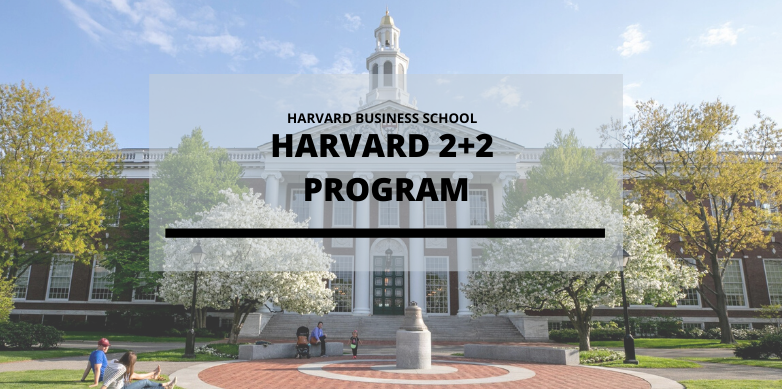
Easily the most popular deferred admission program by a wide margin is the HBS 2+2 program.
The ‘2+2’ stands for two years of full-time work experience followed by two years as a part of the HBS MBA program.
To be eligible for admission via this program, you must not have any full-time work experience. You can apply if you’re in the last year of your undergraduate or postgraduate degree, as long as you have no full-time work experience.
Students of STEM and humanities backgrounds are especially encouraged to apply for the HBS 2+2 program.
However, students from all backgrounds are welcome to apply.
The application process for this program is the same as that of the HBS MBA program. The differences are that it has less than half the application fee and only one deadline as opposed to the multiple rounds that MBA applicants get.
If you require more details regarding the application, you can visit HBS website and click on “View Application Checklist”. They will ask you to fill a small form and then provide you the details.
2. Yale Silver Scholars – Yale School of Management
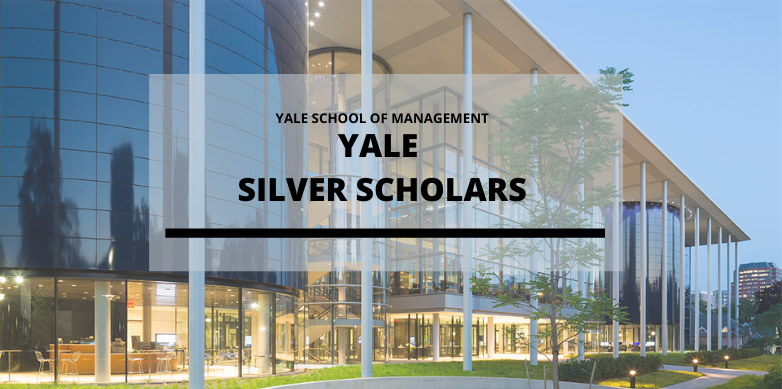
The Silver Scholars program at Yale was started as early as 2001. It is a three-year MBA program rather than the average two-year MBA that Yale offers.
Just like it is with Harvard’s 2+2, you will only be eligible for the Yale Silver Scholars program if you are a student in the final year of your under- or postgraduate program. Having no previous work experience is also a prerequisite for admission under the Silver Scholars program.
The first year of this program involves classroom studies, the second is spent completing a year-long, full-time internship, and in the third year, you return to the classroom to complete the program with electives of your choice.
Applications for the Silver Scholars program are accepted through the MBA application process itself.
However, we strongly recommend that you keep an eye out for special instructions to Silver Scholar applicants on how to navigate through the application process. If you aren’t careful, your eligibility could be compromised due to simple technical errors.
3. Young Leaders Program & Early Entry Option – Indian School of Business
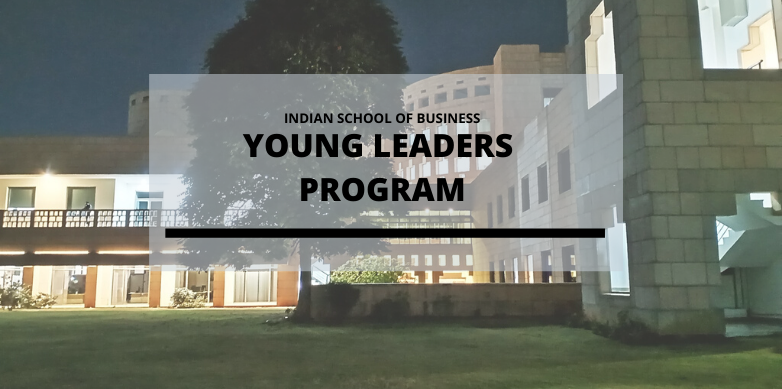
While the YLP is the Indian School of Business’ deferred admission program that’s inspired by Harvard’s 2+2, the EEO is a rather unique proposition from ISB.
The YLP works along the lines of the 2+2 and Silver Scholars programs, except for a few differences. One of these differences is that YLP has a separate application process from the process for MBA applications, with very specific and pointed YLP application essay questions.
On the other hand, the EEO is a program meant for people with less than 24 months of work experience. As opposed to deferred admissions programs designed for students with no work experience, EEO is designed specifically for people who have experience but not enough for an MBA.
In effect, the ISB EEO lets you defer your admission till you can complete at least 24 months of full-time work experience.
At the end of the YLP, you join ISB’s flagship Postgraduate Program (PGP), whereas with EEO, accepting admission signs you up directly for the PGP.
Check out the interview with one of our students who got into the ISB YLP.
ISB has an online application portal, on their website, where you can sign up and apply to the YLP.
Remember that the application process at ISB is divided into three stages. WHile you fill out the application form in Stage 1, you also need to submit an essay along with the application fee.
4. Deferred Enrollment – Stanford GSB
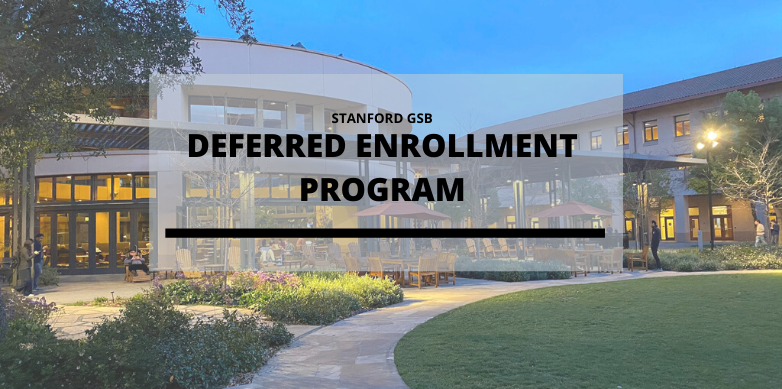
Stanford Graduate School of Business (GSB) deferred enrollment program is considered as popular as Harvard Business School (HBS) 2+2 program.
But this does not mean they are the same.
Let us explain this for you.
Simply, HBS 2+2 program is much more structured than Stanford GSB’s deferred enrollment program.
As the name suggests, HBS 2+2 is a program for students who would like to garner some specific industry experience for two years before they enroll for their MBA program. Whereas if you are a college senior now and have applied to Stanford, you will be enrolled for your MBA any time in the next two to four years. The number of years deferral is not standardized here.
But if you are unsure of your long-term professional path, this program, just like the HBS 2+2 program gives you an opportunity to explore an industry before earning your MBA.
To apply for the Stanford deferred enrollment program, you must either be in the final year of your bachelor degree or enrolled in a graduate program. But you should not have taken a break after your undergraduate program.
If you wish to apply to the Stanford GSB deferred enrollment program, you need to sign up on their website and then receive details from their admissions team regarding the application details and deadlines.
While you can find the general details on their websites without even signing up, you may not be able to move ahead with your application process.
If you feel that you are the right candidate for the course, go ahead and apply. And if you are worried about getting a scholarship, here’s how you can increase your chance of getting one.
5. Deferred Enrollment Program – Columbia Business School
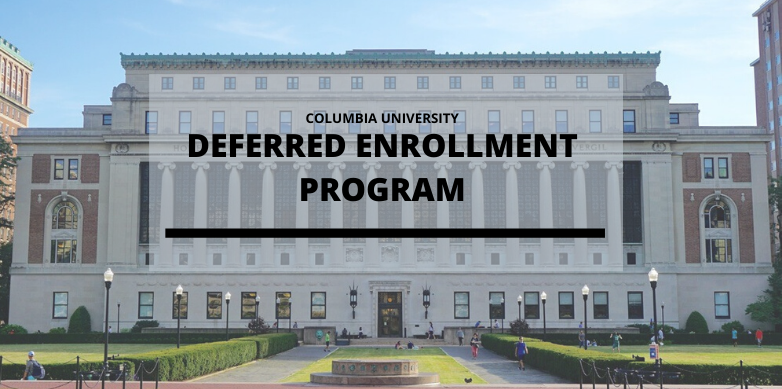
You are opting for a deferred MBA program for a reason – you want industry experience before you take up your MBA.
But how many years would you like to defer?
A year? Two? Or maybe even three? But do all B-schools let you work for so long before you enroll for your deferred MBA program?
Unfortunately, they don’t.
But Columbia Business School (CBS) does, in fact you can defer your program up to five years there. The only thing you need to do before you join the course is to provide proof that you have been productive during the period.
By providing this opportunity, they expect you to thoroughly explore the industry you want to be a part of and be sure of it.
Once you have decided to enroll for the MBA program, all you need to do is to send a letter of intent to the business school stating which program, the 16-month program or the traditional 20-month program with a summer internship, you would like to opt.
If you plan to apply to CBS, you can directly go to their website to complete or resume your application. The link to begin application is available there.
Candidates applying for the regular MBA course and deferred MBA course are expected to write three essay questions during the application process. Please note that the essay questions for the regular MBA application and deferred MBA application are different.
If you are interested to know, you can check out the Top MBA programs across the world as well.
6. Chicago Booth Scholars Program – The University of Chicago Booth Scholars
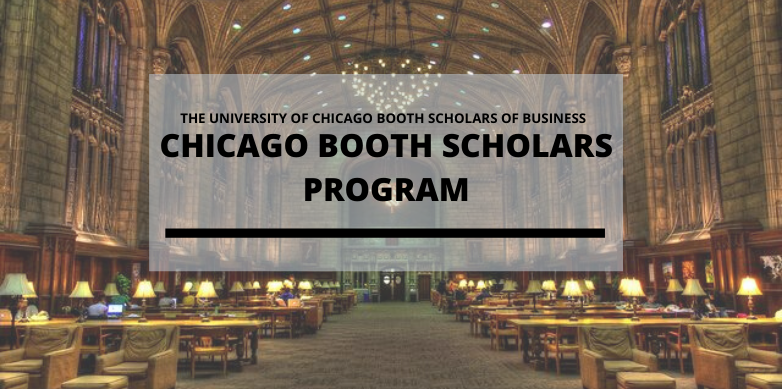
Chicago Booth Scholars Program is similar to Columbia Business School Deferred Enrollment Program; they both offer a deferment period of two to five years.
As having no prior work experience is a prerequisite to apply for the program, the Chicago Booth Scholars Program allows you to complete the MBA application while still at the undergraduate institution.
Similar to other deferred MBA programs, the program at The University of Chicago Booth Scholars of Business accepts candidates from a wide range of backgrounds including Consulting, Healthcare, Sports/ Recreation, etc.
You can apply to the Chicago Booth Scholars Program through their online application system. There are various sections that you are required to fill out before you submit the application.
Remember that you need to keep your professional resume and two letters of recommendation ready before you begin applying to the program.
7. Wharton MBA Advance Access Program – Wharton University of Pennsylvania
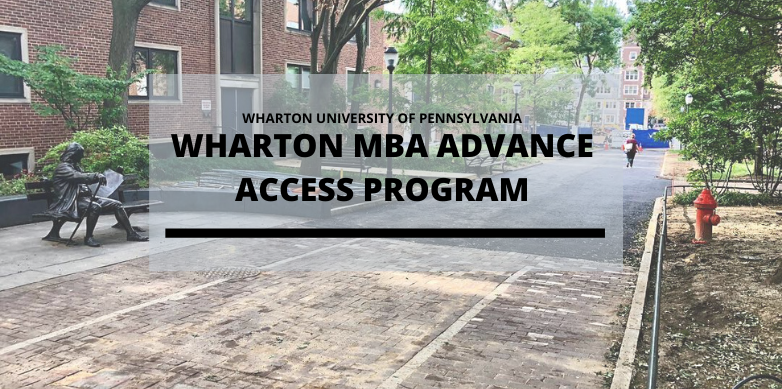
Wharton School of the University of Pennsylvania offers a deferred MBA program under the name of Advance Access Program. As the name of the program suggests, the B-school allows a student in the senior year of their undergraduate course or a graduate in the final year of their course to apply to the MBA program.
But unlike Columbia Business School and Chicago Booth School of Business, Wharton only offers you a deferment period of two to four years.
You might also want to note that unlike other B-schools, Wharton does not have a common deferred MBA program for all applicants. It offers Penn students a guaranteed pathway to the B-school through The Moelis Advance Access Program.
In this program, the Penn students receive a yearly fellowship of $10,000 during their 2-year MBA course.
Unfortunately, this is not applicable to students from other universities.
So, if you are a Penn student, you can go ahead and apply to The Moelis Advance Access Program. If not, don’t be disheartened, you can still apply to Wharton MBA Advance Access Program on their website.
Just like other online MBA applications, you can begin your application process and save it. You can go back and resume it later as well.
But, do not miss the deadlines.
8. Darden Future Year Scholars Program – Darden School of Business
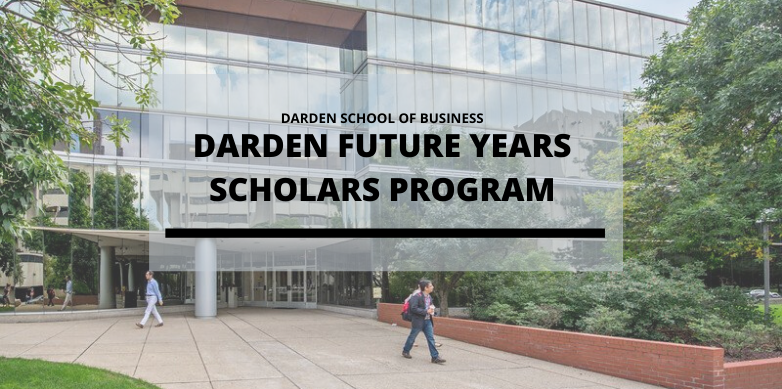
Similar to Wharton MBA Advance Access Program, the Darden Future Year Scholars Program allows an applicant to defer for a period of two to four years.
Once you have been admitted to the program, they expect you to work in the industry of your preference and decide your future goals.
Post this deferment period, you can join Darden School of Business (DSB) for your two-year MBA program.
Along with the course offering, the Future Year Scholars also receive personalized Darden mentors. If you get admitted to the DSB, you can reach out to your personal mentor and get guidance with regard to your MBA program and your career.
Darden has earned its reputation over the years for the case-based method that it follows in teaching. While it is a derivative of what Harvard does, this is one factor that differentiates Darden from the rest of the B-schools.
Just like Stanford GSB, you need to sign up on Darden B-school’s website to get started with your deferred MBA application. Start early enough so that you have enough time to complete your application.
Know what Darden is looking for in your MBA application essay before you start your application process.
9. MIT Sloan MBA Early Admission- MIT Management Sloan School
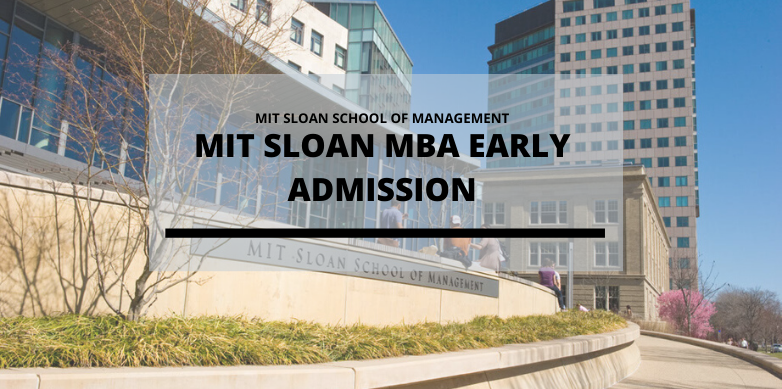
MIT, just like the Harvard School of Business (HBS), offers the finest and the most prestigious MBA programs in the world.
Similar to HBS 2+2, MIT Sloan MBA Early Admission is accessible to the final year students of an undergraduate course or students who are currently attending or are just graduating from a graduate course.
But unlike HBS 2+2 program, MIT Sloan MBA Early Admission program offers a deferment period of two to five years.
The course at MIT is planned in such a way that you will start with a core semester planned by the B-school and then move on to independently planning out your journey. You can do this by meticulously picking your electives and certificate courses.
If you plan to apply to the MIT Sloan MBA Early Admission program, you might want to take note that you will have to keep a video statement ready along with the rest of the documents.
All you need to do to begin your application to MIT Sloan MBA Early Admission is to click the “Start Application” button on their website.
5. How can you apply to these B-schools?
So, if you wish to apply to any of the B-schools mentioned above, there are certain tests like the GMAT or the GRE that you need to take before starting your application process. Or in some cases, you can update your application as you go as well.
There are also a few documents that need to be procured before you start applying to any of these B-schools.
Want to know the application process? Here’s what you need to do before you start your B-school application process
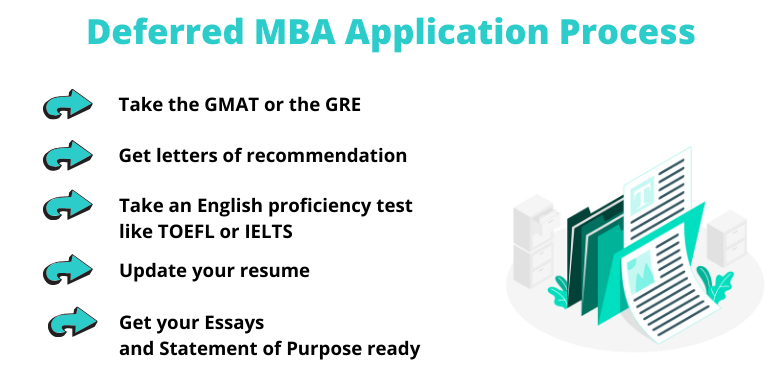
i. Take GMAT/GRE – You will have to provide your test scores during the application
ii. TOEFL/IELTS – In case your native language is not English, you will have to take one of these tests as well
iii. Letter(s) of recommendation – You will have to submit one or two letters of recommendation depending on the B-school. Go through the guidelines given in your preferred B-school website
iv. Your current resume – Be sure that it is updated
v. Essays and Statement of Purpose – Submit essays based on the questions provided by each B-school along with a Statement of Purpose
These are what B-schools generally ask for. But, you will have to thoroughly go through each B-school’s application guidelines to know if you need to keep anything else ready before you start the application process.
Having spoken about the most prominent programs from B-Schools allowing you to take admission into MBA without work experience and the application process, we must mention that there’s an important bifurcation when it comes to selecting B-Schools for you.
It all comes down to figuring out whether you want to look at B-Schools within India or consider B-Schools abroad.
In either case, it’ll probably help you to know that many Indian B-Schools accept GMAT scores. And if you’re considering studying abroad, you have yet another option in the form of the GRE. Consider the pros and cons of GMAT vs. GRE before you decide which test to take.
Our final piece of advice to you in this blog is that you should try to keep in mind that an MBA is a huge decision, and money is not the only thing you’ll need to invest in it. An MBA will impact the future trajectory of your life. So, make sure that you consider all your options carefully before choosing to get your MBA without work experience.
And if you need any help with your GMAT preparation, you can join our Free GMAT micro course. You can also reach out to us if you need any help with your MBA applications as well.

